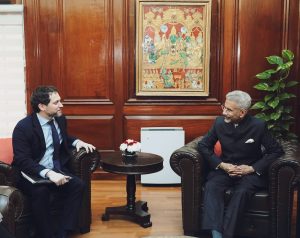Late last month, the United States Department of Justice announced charges against an Indian national for a plot to assassinate a Sikh separatist leader in New York. The charges also mentioned an Indian government official for having “directed a plot to assassinate on U.S. soil an attorney and political activist who is a U.S. citizen.”
The U.S. Justice Department’s charges appeared to vindicate Canadian Prime Minister Justin Trudeau’s claim earlier this year that the Indian government was involved in the assassination of another Sikh separatist leader — a Canadian citizen. In the aftermath of those accusations, New Delhi had reacted with angry denial, expelling Canadian diplomats and suspending visa services for Canadian citizens. Yet, most commentators believed that those tensions would remain contained and would not affect U.S. relations with India.
In view of these latest revelations, there is now a fresh debate in Washington over whether the India-U.S. partnership can truly escape the specter of Sikh separatism. The consensus for now is that it can. But both New Delhi and Washington should be wary of being on a collision course. Regardless of whether these allegations are true, there is a very clear distinction between how India sees the problem of Sikh separatism in the diaspora and how Western governments perceive it.
Many Indians are baffled that the West won’t cooperate in the prosecution of individuals who have — in the U.S. Justice Department’s own words — “called for some or all of Punjab to secede from India and establish a Sikh sovereign state.” New Delhi sees this sort of activism as an overt and active challenge to India’s territorial integrity. To many Indians, the West’s provision of a safe haven to such individuals looks and feels like a betrayal.
But to Western sensibilities, Sikh secessionists are no different from Tibetan or Uyghur secessionists. If Sikh separatist leaders have been involved in incidents of violence, they will have to be tried in a court of law with evidence. To leaders and lawyers in the West, the mere act of dissent and advocacy of secession are not sufficient grounds for prosecution.
In that regard, the stark differences between India and the West over Sikh separatism are a direct fallout of the fact that India and the West increasingly share few of the same values.
In decades past, India’s strong convictions in constitutional law and democracy would have rendered even accusations of an extrajudicial killing overseas unacceptably scandalous. In the aftermath of the 2008 Mumbai attacks, India tried the sole captured terrorist in a court of law — with due process and the full slate of rights — before finally executing him four whole years later. Observers in the West had lauded that process and had also hailed India’s then-Prime Minister Manmohan Singh for showing restraint toward Pakistan.
But the rise of a muscular Hindu nationalism has since engendered an impatience with due process and rule of law, ushering in a culture of extrajudicial violence and mob vigilantism. Extrajudicial violence has been the norm in India’s more recent handling of sundry issues — including cow slaughter, organized crime, and secessionism. Between 2016 and 2022, over 800 people were murdered in extrajudicial killings across India. In particular, the state of Uttar Pradesh has seen an expansion of mob vigilantism since 2017.
Admittedly, Sikh separatism has not been an active security problem in India for decades. But it is still a live political issue and many who sympathize with Prime Minister Narendra Modi’s Bharatiya Janata Party (BJP) would like to see Modi act forcefully against it.
During the widespread farmer protests in 2020-21, Modi’s government had accused Sikh farmer groups of harboring separatist sympathies. On one occasion, a BJP minister’s son was charged with murder after a vehicle rammed through a crowd of protesting farmers in Uttar Pradesh. A close associate of that individual had later labeled the protesting farmers “Khalistanis [Sikh separatists] from Punjab.”
Some of this anger and dissension may plausibly spill over into the United States, where some 500,000 Sikhs live — many as U.S. citizens. In Canada, tensions between the Hindu and Sikh communities have already reached alarming levels.
That brings us back to the question of shared values in the India-U.S. relationship. This June, Daniel Markey, a scholar at the U.S. Institute of Peace, bluntly stated that the very notion that India and the U.S. share values has “come to look fanciful.” Nonetheless, Markey argued, the two countries share interests, and the U.S. must “treat India as it treats Jordan, Vietnam, and any number of other illiberal partners.”
That is certainly the view that many analysts in Washington increasingly take — that the United States should pursue a transactional, security-focused partnership with India, bereft of shared values.
Yet, unlike many of Washington’s illiberal allies — often, exporters of little more than oil to the United States — India’s far more advanced services economy exports things that hinge more considerably on shared values: people and ideas. If communal tensions and mistrust worsen in India, it is perhaps inevitable that some of that would spill over into the Indian community in the U.S.
Given how consequential the Indian-American community is — not just to the U.S. economy but also to India’s own influence in the U.S. — the percolation of communal tensions into the Indian diaspora is a serious threat to both countries’ interests. Many in New Delhi may look at talk of shared values as a feature of U.S. hectoring and ideological posturing. But in fact, the preservation of those shared values is as much an Indian interest as it is an American one.

































